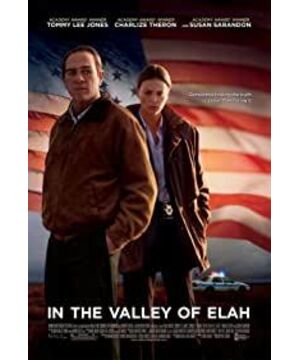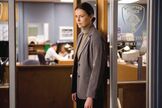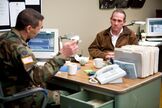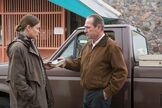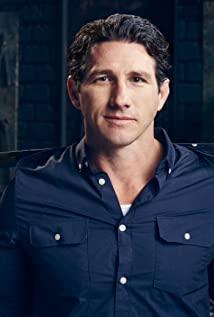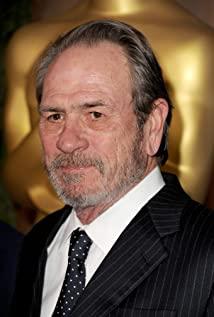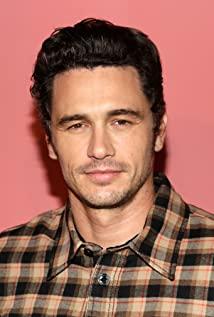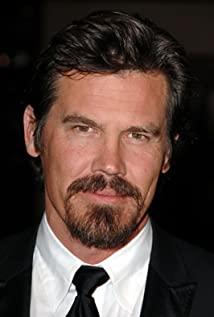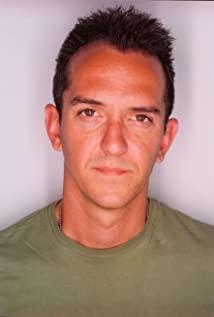The translation into "The Battle of the Valley of Elah" is actually inaccurate, and it is easy to mistake the story as describing a battle in the Valley of Elah. Another translation of its title, "Dilemma", did not grasp the key. The title actually comes from a biblical story Tommy Lee Jones once told to David, the son of Charlize Theron in the film: the giant Goliath crossed the valley of Elah every day to challenge the Israelites, but No one dared to confront him. One day, David, a young boy who delivered a letter, took the initiative to ask the king to fight the giant. In the Valley of Elah, he overcame his fears, stoned the giant in the head, and killed Goliath as he charged.
The film is very clever not to directly describe the Iraq war, but from the inexplicable disappearance of a soldier returning from the Iraq war, which leads the old father to embark on the road of finding his son. Within the framework of a suspenseful story, the hurt, change, and confusion brought about by the Iraq War slowly surfaced along with the truth. The old father found that his son, who used to be pure, kind, and joined the army with patriotism, had become what his comrades called "DOC" (doctor), because he would press the wounds of Iraqi prisoners in Iraq and ask them "Yes." Is it here? Is it here?" Come and have fun. In the surviving video collected from his son's mobile phone, the old father even saw a great change in his son's mind: he was driving an armored car, and there happened to be an Iraqi child in front of him. However, here, the creed of the US military is "Don't park casually. , or there may be an attack waiting for you." So, he slammed on the accelerator and rushed over, and all his comrades reassured him that "it might just be a dog". When these American soldiers came back from Iraq, they all changed. When they went out to drink and indulge, their son and his comrade-in-arms scolded each other over a trivial matter. During the scuffle, the comrade-in-arms who shared life and death on the battlefield took out a knife and stabbed him - a total of 42 knives! Then, one of them who was a butcher dismembered and burned his former comrade-in-arms, and then used his credit card to eat... The old father who had been a soldier all his life could hardly understand all this. How could Paoze attack his brother on the battlefield? Why can a little thing make them so cruel? He silently returned to his hometown and said that an old national flag was raised upside down, which means: Come and save us, the country is facing a major crisis.
Paul Haggis, who shot to fame with "Crash," still has a unique perspective on social issues in his second film, using Tommy Lee Jones' old father figure to show the effects of war. The loss of human nature and the sense of moral loss caused by social changes can be said to be quite clever tactics. The whole film is immersed in a kind of sympathetic and tactful depression, which is very touching and thought-provoking. And Tommy Lee Jones and Susan Sarandon's performances can also be said to be perfect, mellow and sophisticated to an impeccable level, and Charlize Theron can be considered as an actress. Sounds like perfection, doesn't it? However, when I got away from the excellent atmosphere of the film, I felt that the cornerstone of the whole film was not solid: even as the background, the description of the Iraq war was still too superficial, the killing of children, the torture of prisoners of war, these news The suspenseful atmosphere of the story was turned into the character's inner feeling without chewing it; and the suspense atmosphere began to unfold for a long time, but it turned out that the case of killing the son was completely an accident. At most, it can only be said that some people lost control. It also makes people feel a bit deliberately intriguing. The whole film is saying that war is cruel, war changes human nature, but how does human nature change? What kind of spiritual changes have these American soldiers experienced? But they were avoided by the film. Paul Haggis' films seem to have a taste of concept first. They seize one point and wrap it up with ingenious stories and layers of details. The outside looks like a solemn and solid castle, but it is actually built on a pile of sand. , After a long time, it will fade or even collapse.
View more about In the Valley of Elah reviews


